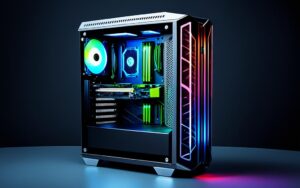Table of Contents

This article will explore practical tips to help you optimize your spending and make the most of your gaming budget.
Set a Budget and Stick to It
One of the most essential steps in managing PC and gaming expenses is creating a clear and realistic budget. This budget should include all anticipated costs, such as hardware upgrades, new game purchases, subscriptions, and even accessories like controllers or headsets. Once the budget is set, it’s essential to stick to it, as overspending in these areas can lead to financial strain.
Learning how to pay bills effectively as part of your budgeting process can help ensure that essential expenses are covered before focusing on gaming costs. Breaking the budget into monthly or quarterly allocations can make it easier to control spending and avoid impulse purchases. By establishing a clear financial limit, you can prioritize the purchases that matter most and keep your gaming hobby from becoming a financial burden.
Prioritize Essential Upgrades
When it comes to upgrading your gaming PC or console, it’s easy to get carried away with the latest and most significant components. However, not every upgrade will significantly improve your gaming experience. Prioritize the components that offer the most noticeable performance improvements, such as a new graphics card (GPU), a solid-state drive (SSD), or additional RAM.
These upgrades often provide the best cost-to-benefit ratio. Non-essential upgrades like RGB lighting or high-end cooling systems can be delayed or avoided altogether if they don’t directly impact gameplay. This approach ensures that your investment is targeted and effective, helping you avoid unnecessary costs.
Buy Used or Refurbished Hardware
Not all gaming hardware needs to be purchased brand new. Used or refurbished components can offer substantial savings without sacrificing quality. Many retailers and online platforms sell certified refurbished hardware, including GPUs, CPUs, and peripherals, often at a fraction of the price of new products. These items typically come with warranties and guarantees, ensuring they function properly.
By buying used or refurbished, you can stretch your budget further, allowing you to invest in higher-performance parts or save money for future upgrades. Additionally, buying second-hand can be an environmentally conscious choice, as it extends the life of electronic components.
Watch for Sales and Discounts
Sales events are an excellent opportunity to save money on both hardware and games. Major sales events like Black Friday, Cyber Monday, and Prime Day often feature significant discounts on gaming equipment and games. Additionally, platforms like Steam, Epic Games, and GOG frequently hold seasonal sales where popular games are discounted.
Subscribing to newsletters or setting up alerts can help you stay informed about upcoming deals. Taking advantage of these discounts allows you to acquire the games or components you want at a lower price, making it easier to stick to your budget while still enjoying your hobby.
Sell Unused Games and Hardware
If you have old games or hardware gathering dust, selling them can be an effective way to offset the cost of new purchases. Many online platforms, such as eBay and Facebook Marketplace, and specialized sites like Decluttr, allow you to sell used games, consoles, or components.
Many retail stores also offer trade-in programs that provide store credit or cash for your old gear. This is a great way to declutter your space while recouping some of your initial investment. By selling or trading in items you no longer use, you can make room for new online games or hardware without taking a hit to your wallet.
Use Subscription Services
Instead of buying individual games, which can add up quickly, consider subscribing to services that offer access to a broad library of games for a single monthly fee. Services like Xbox Game Pass, PlayStation Plus, and EA Play provide subscribers with access to a rotating catalog of games, often including new releases.
This approach allows you to play a wide variety of games without having to purchase each one individually. It’s also a cost-effective way to try out games that you may not have considered buying. Subscription services can help you get more gaming for your money, especially if you buy a lot of games each year.
Limit In-Game Purchases
Microtransactions and in-game purchases, such as cosmetics, loot boxes, or additional content, can quickly accumulate and become a significant expense. Many games, especially free-to-play titles, rely on these purchases to generate revenue. While buying a new skin or character may seem like a small cost, these purchases can add up over time.
To avoid overspending, set a monthly or yearly limit on in-game purchases or avoid them altogether if they do not enhance your gaming experience in a meaningful way. It’s important to distinguish between purchases that provide actual gameplay value and those that are purely cosmetic, ensuring that your spending stays within reasonable limits.
Avoid Early Adoptions
Buying new games and hardware at launch often comes with a premium price tag. Early adopters not only pay more but also face potential bugs or performance issues that can detract from the overall experience. Waiting a few months after a product’s release often offers better value, as you can often find discounts or bundled deals.
During this waiting period, game developers usually release patches and updates to fix any initial issues, leading to a smoother and more enjoyable experience. Patience pays off in the gaming world, as you can save money and avoid potential frustrations by delaying your purchases.
Upgrade Smartly Instead of Replacing
Rather than replacing your entire PC or console every few years, consider upgrading specific components to extend the life of your system. For example, adding more RAM, upgrading your SSD, or improving your cooling system can significantly boost performance without the need for a complete system replacement.
This incremental approach allows you to spread out the cost of upgrades over time, making it more manageable. Additionally, upgrading individual parts ensures that you only spend money where it’s needed, helping you get more out of your existing setup while staying within your budget.
Track Expenses and Use Price Alerts
Keeping track of your gaming and PC-related expenses is essential for managing your budget effectively. Use budgeting apps like Mint, YNAB (You Need a Budget), or even a simple spreadsheet to monitor how much you spend on hardware, games, and subscriptions.
Additionally, websites like PCPartPicker and Steam offer price alert features that notify you when an item you’re interested in drops in price.
This allows you to make informed purchasing decisions and avoid paying full price. By tracking your expenses and using price alerts, you can stay on top of your spending and ensure that you’re getting the best deals available.
Leverage Free-to-Play Games
Many high-quality games today are offered for free, with optional in-game purchases for cosmetics or additional content. By focusing on free-to-play titles, you can enjoy a wide variety of gaming experiences without having to buy new games regularly. However, it’s important to remain cautious about in-game spending to ensure you don’t negate the savings. Free-to-play games are a great way to stay within your gaming budget while still exploring new content.
Use Cloud Gaming Services
Instead of investing heavily in high-end PC components, consider using cloud gaming services like NVIDIA GeForce Now, Xbox Cloud Gaming, or PlayStation Now. These platforms allow you to play graphically demanding games on lower-end systems by streaming them from powerful remote servers. This can save you from having to upgrade your hardware frequently while still enjoying top-tier games of high quality.
Join Communities for Game Sharing
Joining gaming communities where you can share or trade games with other players is an excellent way to access new titles without spending money. Some platforms, like Steam, allow you to share your game library with friends or family members through features like Steam Family Sharing. This will enable you to try out different games without purchasing them yourself, providing a cost-effective way to expand your gaming options.
Avoid Collector’s Editions and Premium Versions
When purchasing new games, the base version is usually sufficient to enjoy the full gaming experience. Collector’s editions or premium versions often come with extra content or physical items like figurines, but these can be significantly more expensive. Unless you’re a die-hard fan of a particular franchise, avoid these pricier versions and opt for the standard game. This will help you stick to your budget while still enjoying the full gameplay experience.
Use Energy-Efficient Equipment
Power-hungry gaming PCs and consoles can drive up your electricity bill over time. Investing in energy-efficient components, such as power supplies with a higher efficiency rating (e.g., 80 Plus certification) or energy-saving monitors, can reduce ongoing costs. Additionally, turning off your gaming setup when not in use and optimizing your PC’s power settings can lead to long-term savings on your utility bills. Understanding how to pay bills related to household expenses, including utilities, will help you manage both your gaming costs and general living expenses more effectively.
Conclusion
By implementing these practical tips, you can significantly reduce your PC and gaming expenses without sacrificing enjoyment. From careful hardware selection to mindful software purchases, there are numerous ways to optimize your budget. Remember, it’s about finding a balance between affordability and performance.










